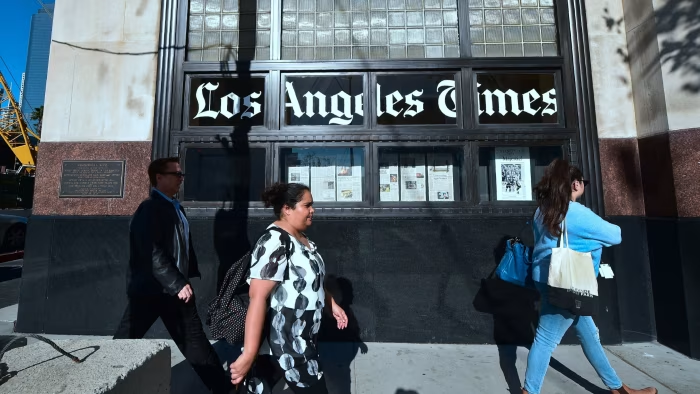Billionaires Aim to Restore Trust in US News Media
Tech billionaires Patrick Soon-Shiong and Jeff Bezos are taking steps to address bias and restore trust in the Los Angeles Times and Washington Post. Soon-Shiong is developing an AI-powered “bias meter” for the LA Times, while Bezos is working on new ideas for the Washington Post. These efforts have sparked criticism from press advocates and journalists, who are concerned about the implications for newsroom independence and trust. In a bold move to tackle the growing trust deficit in the US news media, tech billionaires Patrick Soon-Shiong and Jeff Bezos have announced initiatives to overhaul the Los Angeles Times and Washington Post, respectively. Soon-Shiong, who acquired the LA Times in 2018, revealed plans for an artificial intelligence-powered “bias meter” to help readers identify potential biases in news stories. This tool aims to provide readers with balanced perspectives by offering both sides of a story. During an appearance on political commentator Scott Jennings’ radio show, Soon-Shiong emphasized the need for transparency in journalism, questioning whether news reports are truly objective or influenced by personal opinions. His comments have drawn criticism from press advocates and journalists, who argue that such measures could undermine newsroom independence and trust. Ann Marie Lipinski, curator of Harvard’s Nieman Foundation for Journalism, expressed concerns about the potential negative impact on the already fragile news industry. Vivian Schiller, former CEO of NPR, described the plans as a “nightmare” scenario for a billionaire-owned media outlet. Jeff Bezos, who bought the Washington Post in 2013, acknowledged the challenges faced by traditional media in maintaining public trust. Speaking at the New York Times’ DealBook conference, Bezos shared his commitment to revitalizing the Post, despite recent financial losses and declining readership. He hinted at new innovations to address these issues but did not provide specific details. Both Soon-Shiong and Bezos faced backlash for withdrawing their newspapers’ endorsements of presidential candidate Kamala Harris shortly before the US election, a move that further fueled controversy within their newsrooms. As trust in the US news media continues to decline, with less than a third of Americans expressing confidence in fair and accurate reporting, the efforts by Soon-Shiong and Bezos highlight the ongoing struggle to balance journalistic integrity with the evolving demands of the digital age. Source: Ft.com Photo Credit: Ft.com


